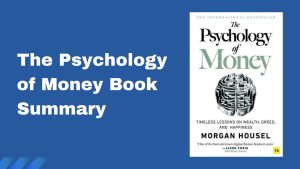
The Psychology of Money by Morgan Housel is a must-read book that explores how human behavior influences financial decisions. Unlike traditional finance books that focus on numbers and strategies, this book delves into the psychological aspects of money management.
If you’re looking for The Psychology of Money PDF, The Psychology of Money summary, or even The Psychology of Money audiobook, this guide will give you a comprehensive breakdown of its key lessons.
The Psychology of Money Summary
1. Money Is Emotional, Not Logical
People often assume that wealth is about intelligence, but in reality, financial success depends on discipline, patience, and emotional control. Making decisions based on fear, greed, or overconfidence can lead to financial mistakes.
2. The Power of Time and Compounding on The Psychology of Money Book
One of the biggest lessons from The Psychology of Money book is that long-term investing and patience are the keys to building wealth. Warren Buffett, for example, made most of his fortune not just through smart investments but by staying in the market for decades.
3. Luck and Risk Play a Big Role
Success in finance isn’t always about skill—luck and risk matter too. Some people become wealthy due to fortunate circumstances, while others fail despite making smart financial choices. The best approach is to manage risk and stay financially prepared.
4. Saving Is More Important Than Earning More
A high income doesn’t guarantee financial security. The Psychology of Money by Morgan Housel emphasizes that controlling expenses and consistently saving money is more powerful than earning a huge salary.
5. True Wealth Is About Freedom on The Psychology of Money Book
Money should give you control over your time and life. Instead of chasing luxury, focus on achieving financial independence so you can make choices without worrying about money.
6. Avoid Emotional Investing
Market crashes and booms often cause people to make rash decisions. Those who panic and sell during downturns often miss out on long-term growth. Staying calm and sticking to a long-term investment strategy is essential.
The Psychology of Money PDF & Audiobook Download
Many readers search for The Psychology of Money PDF download or The Psychology of Money filetype:pdf to get a free version of the book. However, to support the author and get the best experience, it’s recommended to buy the official book or listen to The Psychology of Money audiobook on platforms like Audible.
If you’re looking for The Psychology of Money summary PDF, many sites offer condensed insights, but reading the full book provides a deeper understanding of financial psychology.
The Psychology of Money Review
The Psychology of Money review from readers and critics has been overwhelmingly positive. The book is praised for its easy-to-understand approach, real-life examples, and timeless lessons about managing money.
Whether you’re new to finance or an experienced investor, The Psychology of Money book is a valuable read that can change how you think about wealth.
Frequently Asked Questions (FAQ)
1. What is The Psychology of Money about?
The Psychology of Money explores how human behavior, emotions, and psychology impact financial decisions. The book teaches that managing money is more about mindset than intelligence.
2. Where can I find The Psychology of Money PDF?
While many people search for The Psychology of Money PDF download, it’s best to purchase the official version to support the author and access high-quality content.
3. Is The Psychology of Money audiobook available?
Yes! The Psychology of Money audiobook is available on platforms like Audible and Google Play Books.
4. What are the key lessons from The Psychology of Money?
Some of the biggest takeaways include:
- Financial success is based on behavior, not intelligence.
- Compounding is the most powerful wealth-building tool.
- Risk and luck both influence financial outcomes.
- Saving is more important than a high income.
- Financial freedom is the ultimate goal.
5. Is The Psychology of Money worth reading?
Absolutely! The book has received excellent reviews for its practical insights, real-life examples, and easy-to-understand writing style.
Final Thoughts
The Psychology of Money by Morgan Housel isn’t just a book—it’s a mindset shift. By understanding the psychological side of money, you can make smarter financial decisions, avoid emotional pitfalls, and build long-term wealth.


